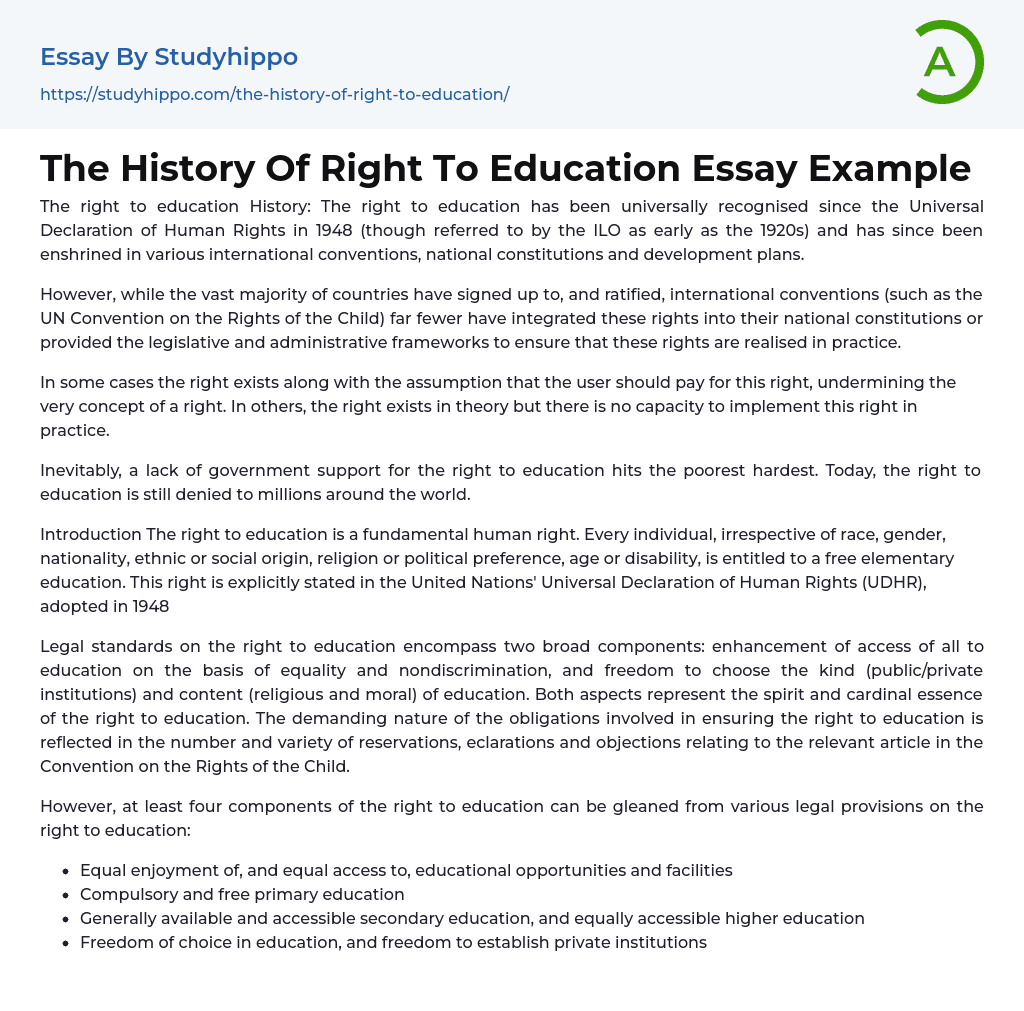The right to education History: The right to education has been universally recognised since the Universal Declaration of Human Rights in 1948 (though referred to by the ILO as early as the 1920s) and has since been enshrined in various international conventions, national constitutions and development plans.
However, while the vast majority of countries have signed up to, and ratified, international conventions (such as the UN Convention on the Rights of the Child) far fewer have integrated these rights into their national constitutions or provided the legislative and administrative frameworks to ensure that these rights are realised in practice.
In some cases the right exists along with the assumption that the user should pay for this right, undermining the very concept of a right. In others, the right exists in theory but there is no capacity to implement this right in practice
....
Inevitably, a lack of government support for the right to education hits the poorest hardest. Today, the right to education is still denied to millions around the world.
Introduction The right to education is a fundamental human right. Every individual, irrespective of race, gender, nationality, ethnic or social origin, religion or political preference, age or disability, is entitled to a free elementary education. This right is explicitly stated in the United Nations' Universal Declaration of Human Rights (UDHR), adopted in 1948
Legal standards on the right to education encompass two broad components: enhancement of access of all to education on the basis of equality and nondiscrimination, and freedom to choose the kind (public/private institutions) and content (religious and moral) of education. Both aspects represent the spirit and cardinal essence of the right to education. The
demanding nature of the obligations involved in ensuring the right to education is reflected in the number and variety of reservations, eclarations and objections relating to the relevant article in the Convention on the Rights of the Child.
However, at least four components of the right to education can be gleaned from various legal provisions on the right to education:
- Equal enjoyment of, and equal access to, educational opportunities and facilities
- Compulsory and free primary education
- Generally available and accessible secondary education, and equally accessible higher education
- Freedom of choice in education, and freedom to establish private institutions
- Academia essays
- Higher Education essays
- Language Learning essays
- Studying Business essays
- Education System essays
- Study essays
- First Day of School essays
- Scholarship essays
- Pedagogy essays
- Curriculum essays
- Coursework essays
- Studying Abroad essays
- Philosophy of Education essays
- Purpose of Education essays
- Brainstorming essays
- Educational Goals essays
- Importance Of College Education essays
- Brown V Board of Education essays
- The Importance Of Higher Education essays
- Online Education Vs Traditional Education essays
- Academic And Career Goals essays
- Academic Integrity essays
- Brown Vs Board Of Education essays
- Distance learning essays
- Technology in Education essays
- Vocabulary essays
- Writing Experience essays
- Importance of Education essays
- Early Childhood Education essays
- Academic Degree essays
- Academic Dishonesty essays
- School Uniform essays
- Academic writing essays
- Cheating essays
- Bachelor's Degree essays
- MBA essays
- College Life essays
- Grade essays
- Diploma essays
- Phonology essays
- Sentence essays
- Filipino Language essays
- Pragmatics essays
- Millennium Development Goals essays
- History Of Education essays
- Graduate School essays
- Middle School essays
- School essays
- Special Education essays
- University essays




